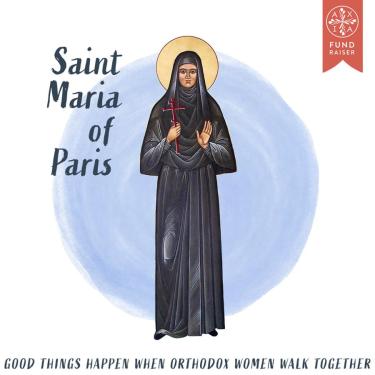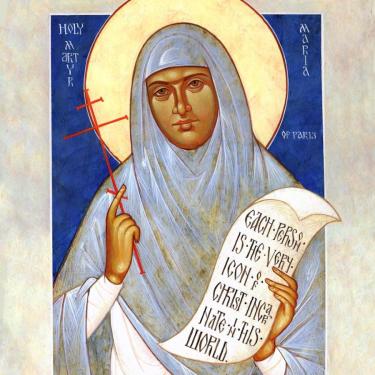
For our next companion, we’ve chosen Mother Maria of Paris, a convention-breaking woman with an enormous heart and a brilliant mind, whose journey from the intellectual revolutions of Russia into the lives of the downtrodden on the streets of Paris changed her life forever.
In 1923, a refugee arrived in Paris after a dangerous journey through Eastern Europe, fleeing Russia in the midst of revolution and civil war. Her name was Elizabeth Pilenko.
Elizabeth’s new life in Paris was filled with poverty and struggle, and within several years she witnessed the death of both of her daughters, also leading to the dissolution of her marriage. In her grief, she wrote, “However hard I try, I find it impossible to construct anything greater than these three words, ‘Love one another’ —only to the end, and without exceptions: then all is justified and life is illumined, whereas otherwise it is an abomination and a burden.”
These words would turn out to be the summary of the rest of her life’s work. Soon after this experience, Elizabeth decided to take monastic vows and received the name Maria. Eventually, she would be known as “Mother Maria (or Marie) of Paris”. She had, she wrote, become “aware of a new and special, broad and all-embracing motherhood…[I saw a] new road before me and a new meaning in life, to be a mother for all, for all who need maternal care, assistance, or protection.”
Mother Maria had first-hand experience of the widespread poverty and despair among other Russian immigrants, and soon after professing monastic vows she rented her first home to offer as a place of hospitality. She seemed to intuitively know that the suffering she had endured was what gave her a deep solidarity and connection with the downtrodden and despairing.
“About every poor, hungry and imprisoned person the Saviour says ‘I’: ‘I was hungry and thirsty, I was sick and in prison.’” she wrote. “To think that he puts an equal sign between himself and anyone in need...I always knew it, but now it has somehow penetrated to my sinews. It fills me with awe.”
When the Nazi occupation of France came. Mother Maria and several others from their home worked as part of the resistance, aiding and harboring many Jews before eventually being discovered and sent to concentration camps. Surrounded by brutality and nightmare on every side, she nevertheless organized intellectual discussions, created art, and formed groups of mutual aid that kept the flame of dignity and humanity alive even in the most inhumane of conditions. Eventually, she was one of many who perished in the gas chambers, possibly in place of another. Either way, up to the moment of her death, Mother Maria continued to “love to the end, without exception.”
Although her writings and words could sometimes be fiery, Mother Maria was committed to the dignity and the giftedness of all people, retaining a sense of joy and creativity even in the midst of much suffering. She companions us as a witness to the ordinary pilgrimage of compassion and love: that each person is an irreplaceable icon of God, living here among us.
We invite you to join us on this pilgrimage to build Axia as we walk in the company of Orthodox women past and present, raising up one another’s gifts for the well-being of the whole Church.



